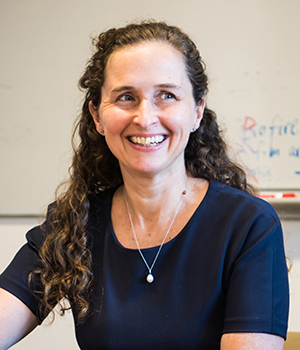
Hadley Sikes
(she/her)
Chemical Engineering
Teaching beyond the lab
Professor Hadley D. Sikes is more than just an academic advisor to her graduate students She is a role model, a friend, and a sage mentor. One of her former students writes, “[Sikes] completely supported me as a person holistically, and allowed me to become the type of scientist and person that… I really wanted to become.” To recognize this incredible devotion to the wellbeing of her students inside and outside of the lab, Sikes has been honored with a Committed to Caring (C2C) Award.
Sikes joined the MIT’s Department of Chemical Engineering in 2009 and is now Associate Professor and the Esther and Harold E. Edgerton Career Development Professor. She earned her PhD from Stanford University in Physical Chemistry and, before coming to MIT, Sikes completed two postdoctoral fellowships, the first at the University of Colorado-Boulder, and the second at the California Institute of Technology (Caltech).
The Sikes lab works in epigenetics, redox biology, and diagnostics, specifically asking questions like “How can we sensitively detect epigenetic modifications that can guide cancer treatment?”, “How do we induce oxidant-specific perturbations in tumors for therapeutic benefit?” and “How can we reinvent the binding molecules, signaling reactions and assay formats used in medical diagnostics?” The research conducted in the Sikes lab contributes to the improvement of medical diagnostic testing for a wide range of diseases.
Fighting for mental health
Mental health and overall well-being is a priority in the Sikes lab. One nominator notes that Sikes “shows a genuine concern for my welfare and well-being and is always willing to help me in whatever way she can.”
Sikes is sensitive to conditions that detract from student wellness. From her decades of lab experience, Sikes identifies “overly long working hours,” “losing a sense of purpose,” and “feelings of isolation” as three of the most common contributors to poor mental health in graduate students. Her commitment to caring has driven her to develop ways fight these issues in her own lab.
“With ambitious projects, it is common to encounter difficulties, but working all the time is not the answer – nor is it sustainable,” Sikes says. To help battle such extended work hours in her lab, Sikes talks openly with her lab members and encourages them to prioritize interests and relationships outside of the lab.
When this sense of purpose fades, which Sikes often sees several years into doctoral research, she reminds her students of the impact of their work in the broader world outside of MIT. The impact of the Sikes Lab in the real-world includes improving diagnostics and therapeutic strategies for diseases like malaria, tuberculosis, and cancer.
Sikes notes that doctoral research can be isolating in many ways, both personally and professionally. To guard against professional isolation, “we form sub-groups of related thesis projects and meet regularly to help one another with troubleshooting.” To fight personal isolation, Sikes supports the social outings and informal gatherings her graduate students organize to enable getting to know one another outside of the lab.
Striving for work/life balance
Sikes’ students laud her for caring for their whole selves and recognizing that their lives extend beyond MIT. In a nomination letter for the C2C Award, one student wrote, “I find it remarkable that Hadley found the time to understand what each one of us in her research group was going through personally, something that of course can have a deep effect on one’s work and research.”
Another nominator wrote of their experience with Sikes, saying, “It was clear she cared about me not just as someone who would conduct research in her lab but as someone passionate about engineering who she wanted to see succeed.”
Balancing work and life is a constant struggle but not one that can ever be “accomplished,” says Sikes. “I have not been able to achieve this magical, efficient state but it has been reassuring to see that the same is true for many other families—work and life are messy and hectic and overflowing but that is okay. I count my blessings.”
Sikes values the time she spends with her husband and three children and feels fortunate to have established good friendships with other families with young children at MIT. “The community that MIT’s onsite childcare center facilitates has been really important to me,” Sikes remarks.
Above and beyond
Sikes offers her students more than just guidance about research. She provides students “informal advising” (a Mentoring Guidepost identified by the C2C program), including advice on how to navigate the field of Chemical Engineering after MIT. One student comments, “I find my discussions with Sikes extremely enriching as she often shares her own rich and varied experiences [as well as] those of her former students.”
In addition, Sikes does not always wait for her students to come to her but instead may proactively offer guidance, another of the Mentoring Guideposts. “In many cases,” one nominator shared, “I don’t even need to ask her for advice as she herself takes the initiative and educates me about various things.”
Sikes is especially committed to cultivating a diverse and welcoming lab (another of the Mentoring Guideposts identified by the C2C program). “In my lab, I place a lot of emphasis on the ability and inclination to work well with others,” Sikes says. “I believe the result is an environment where researchers from a variety of backgrounds feel accepted and are able to contribute and develop their talents.”
This effort has not gone unnoticed by her students. One nominator noted that Sikes is “invested in our career development even when it comes at a cost to her” in terms of money or time, further noting “This care and respect generates loyalty and creates a positive morale in her research group.”
